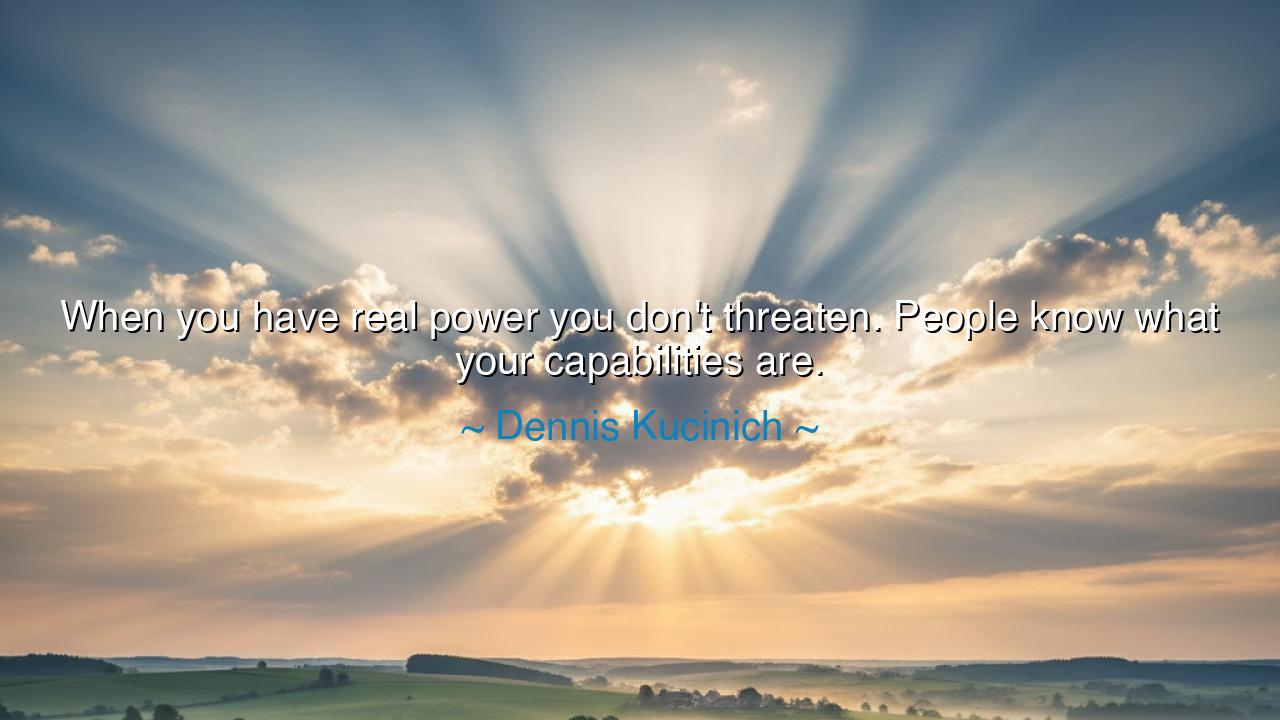
When you have real power you don't threaten. People know what






In the words of Dennis Kucinich, “When you have real power you don't threaten. People know what your capabilities are,” we hear the voice of wisdom speaking against vanity and pretense. Power, when true, has no need of loud display. The sword that must constantly be waved is less fearsome than the one sheathed at the warrior’s side, for all who see it know what it can unleash. The one who truly holds strength has no need to boast; his very presence proclaims what words cannot.
The meaning is clear: threats are the tools of the insecure, those who seek to mask weakness with noise. But genuine authority, whether of a leader, a general, or even a parent, is recognized without shouting. A lion does not need to roar for every creature of the savanna to know its might. So too with human power: silence can be more commanding than empty threats, for silence carries the weight of certainty.
History gives us the example of Genghis Khan, who rarely needed to threaten his enemies with words. His reputation alone, carried on the wind of his victories, was enough to cause cities to surrender before his armies arrived. In contrast, lesser warlords barked and blustered, but were forgotten, for their words could not be carried by deeds. Kucinich’s teaching rests on this eternal truth: it is capability, not noise, that commands respect.
The lesson applies not only to rulers and warriors but to all who wield influence. The teacher who commands the respect of pupils does so not through constant scolding, but through the quiet authority of knowledge. The craftsman proves his mastery not with boasts but with the perfection of his work. The parent disciplines not with threats, but with a steady presence that needs no explanation. Power, in all its forms, is most visible when it is least advertised.
Thus, let this wisdom endure: let your strength be known through action, not through noise. Threats are the rustling of dry leaves; true capability is the oak that stands unmoved by storm. Seek not to proclaim what you can do—live so that the world already knows. For the greatest power is not the loudest voice, but the steady flame that needs no wind to prove its fire.






TLLe thuy linh
What stands out to me is the idea that real power doesn’t require threats or displays of force. But I wonder, can someone truly demonstrate their capabilities without first proving their power in some way? In a world where appearances and impressions matter so much, can we truly trust that people will recognize quiet strength without needing explicit action or reminders? What does it say about how we value leaders and figures of authority?
BAHuynh Ngoc Bao An
I find it intriguing how Kucinich's words speak to the subtlety of power. Power that's well-known doesn't need to be flaunted, because others inherently know its presence. But is there a point where not asserting one's power could be seen as weakness? Can leaders in modern times, especially in politics or business, afford to remain quiet while others may misunderstand their intentions? Could this be a fine line between strength and vulnerability?
MANguyẽn Mai Anh
Dennis Kucinich seems to suggest that power should speak for itself, without the need for constant reminders or threats. But in today's world, can true power ever be fully understood without showing its strength? Does this imply that real power is also about wisdom in using capabilities sparingly, only when necessary? It’s a reminder that true authority doesn’t need to scream for attention – it quietly commands respect.
Gggggg
This quote suggests that true power doesn't rely on forceful gestures or threats. Rather, it's about quiet confidence in one's abilities. But does this mean that individuals or leaders who use threats are not as powerful as they claim to be? Is it possible that power is often misrepresented as control through fear, rather than respect and skill? This raises interesting questions about how we perceive authority in our society.